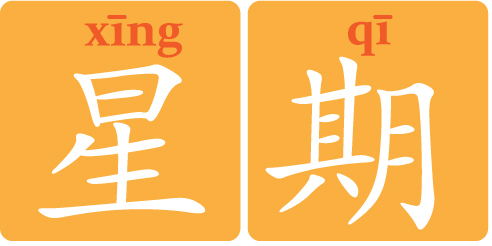Difference between revisions of "Language/Mandarin-chinese/Vocabulary/Days-of-the-week"
| Line 26: | Line 26: | ||
The most common way to say the days of the week in Chinese is to use 星期 (xīngqī). | The most common way to say the days of the week in Chinese is to use 星期 (xīngqī). | ||
[[File:星期.jpg | |||
[[File:星期.jpg]] | |||
If you mean 1 week, then you can say 一个 星期. Remember to use the classifier 个 between the number and the word "week"! If you do not understand this grammatical point, I invite you to go and read my guide on classifiers, also called specifics. | If you mean 1 week, then you can say 一个 星期. Remember to use the classifier 个 between the number and the word "week"! If you do not understand this grammatical point, I invite you to go and read my guide on classifiers, also called specifics. | ||
Revision as of 22:48, 6 January 2022
你好 Chinese Learners! 😃
➡ In today's lesson you will learn the 7 days of the week in Chinese.
Happy learning!
3 ways to say the days of the week
In Chinese, there are three ways of saying "week": 星期 (xīngqī), 周 (zhōu) and 礼拜 (lǐ bài).
These three words are synonyms! You can use them all to build the days of the week (Monday to Sunday).
But then, do you have to know the three vocabulary words?
To express yourself, no. You can choose and use only one of these words.
However, if you want to be sure that you understand all Chinese speakers, I advise you to know, at least passively, the other two ways of saying the days of the week. This way you will be able to understand the Chinese no matter what word they are used to using!
星期: The most common way to say week
Using 星期
The most common way to say the days of the week in Chinese is to use 星期 (xīngqī).
If you mean 1 week, then you can say 一个 星期. Remember to use the classifier 个 between the number and the word "week"! If you do not understand this grammatical point, I invite you to go and read my guide on classifiers, also called specifics.
Thanks to the word 星期, you will be able to compose very easily every day of the week in Chinese. From Monday to Saturday, just add the number corresponding to the day behind the word 星期.
For example, Monday will say 星期一, Tuesday will say 星期二, and so on. Easy, isn't it? If you've forgotten how to say numbers, don't hesitate to check out this article where I explain how to count in Chinese without making mistakes.
There is, however, one exception: Sunday is NOT 星期 七, but is said 星期日 or 星期天.
Here is a little recap with all the days of the week in Chinese:
- Monday: 星期一 (xīngqī yī)
- Tuesday: 星期二 (xīngqī’èr)
- Wednesday: 星期三 (xīngqīsān)
- Thursday: 星期四 (xīngqīsì)
- Friday: 星期五 (xīngqīwǔ)
- Saturday: 星期六 (xīngqīliù)
- Sunday: 星期日 / 星期天 (xīngqīrì / xīngqītiān)
白天 bái tiān - days of the week
| 中文 | pinyin | English |
|---|---|---|
| 星期一 | xīngqī yī | Monday |
| 星期二 | xīngqī èr | Tuesday |
| 星期三 | xīngqī sān | Wednesday |
| 星期四 | xīngqī sì | Thursday |
| 星期五 | xīngqī wŭ | Friday |
| 星期六 | xīngqī liù | Saturday |
| 星期天 | xīngqī tiān | Sunday |

